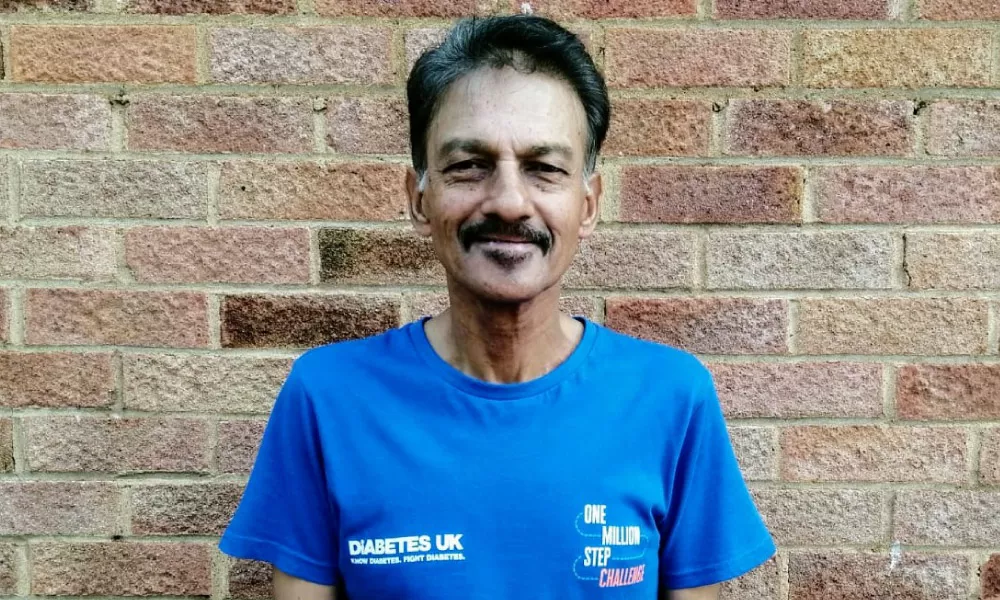
Our supporter and Community Champion Abdul Rais talks about his type 2 diabetes, Ramadan, his work raising awareness of the condition in the South Asian community, and shares his top tips for diabetes management and good mental health.
Our supporter Abdul Rais from Milton Keynes has lived with type 2 diabetes since 1999.
His diagnosis in 1999 was a shock, but Abdul made a lot of changes and found that his work as a volunteer and community champion has helped him understand diabetes better.
Over 20 years of raising awareness of diabetes in the South Asian community
Abdul became a Community Champion for Diabetes UK Midlands and East in 2001.
He said: “I feel so fortunate and grateful to DUK for training me. I’ve been helping raise awareness for over 20 years. I am particularly focused on the South Asian Community as this is one of the communities at the highest risk of type 2 diabetes.
"There are cultural, religious, and language barriers particularly among the older generation. There’s also mistrust due to the lack of integration and ancient beliefs about herbal, natural and other alternative medicines compared to modern medicine.
"More recruitment and understanding are needed from the South Asian Community in order to win over the trust before the awareness message has any impact. Also, more understanding is required of their culture so perhaps some training is needed on both sides."
Managing diabetes during Ramadan
He told us how he cannot fast during Ramadan and shared his advice as a Muslim living with the condition: “I do not fast as I’m on insulin and do not feel it would be safe to fast. I give the equivalent of two meals a day for the 30 days of Ramadan to a charity that feeds the poor.
"My advice would be to talk to your healthcare professional and to an Imam who understands what diabetes is before deciding whether to fast during Ramadan.
"As for Eid, I think it’s less of worry if people go a bit ‘overboard’ with food just for one day. However, it would not be beneficial if they go on celebrating for several days and the food regime gets totally out of control.”
Volunteering and valuing life
Abdul's shock diagnosis and subsequent work as a volunteer and community champion has helped him understand diabetes better and help others.
He said: “I was admitted into a hospital for something else. It was during a blood test that they discovered that I had type 2 diabetes. I was told that my blood glucose levels were so high that I would have gone into a diabetic coma, had I not been diagnosed when I was.
"It was a truly frightening experience as I knew nothing about diabetes at that stage. I felt guilty for not recognising the classic symptoms like, constant thirst, urge to pass water all the time, blurry vision, feeling lethargic and wounds taking a long time to heal. I made small changes to my lifestyle quite a few years ago now. I started walking regularly.
"And now I’ll just have a piece of chocolate instead of sitting with a box of chocolates in the evening. When I was first diagnosed and put on insulin, that ended my Freelance IT consultancy career since I used to do a lot of travelling and had started experiencing hypos quite often. My new career was translation and interpreting and I now freelance and volunteer for Diabetes UK and other charities.”
Abdul’s top 5 tips for managing his diabetes:
- Eat less carbs, more fruit and vegetables, lentils, etc.
- Less fried and oily food, especially samosas, pakoras and onion bhajis.
- Smaller meals but more often (say, every 4-5 hours).
- More physical activity (minimum 30-minute walk or 10,000 steps daily).
- Less time spent in a sedentary position.
Abdul’s top 5 tips for managing his mental health with diabetes:
- I value life and good health and so I’m constantly on the lookout to find things help me feel good.
- I find volunteering a good way to make me feel good.
- I go for long walks and observe nature (greenery, birds and small animals like squirrels/rabbits).
- I like watching comedies on TV from the years gone by.
- I like light reading.
